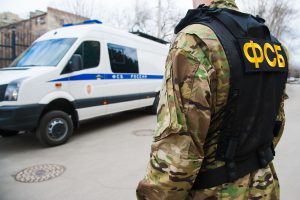On March 9, Kazakhstan’s National Security Committee (KNB) confirmed media reports that two Kazakh citizens had been killed by law enforcement in Russia.
Two days earlier, on March 7, the Russian Federal Security Service (FSB) said it had stopped an Islamic State Khorasan Province (ISKP) cell from carrying out a terrorist attack targeting a synagogue.
“On the territory of the Kaluga Region, a stop was put to the activity of Wilayat Khorasan, a cell of the Afghan branch of the international terrorist organization Islamic State, which is banned in Russia, whose members were planning to commit a terrorist act against one of the Jewish religious institutions in Moscow,” the FSB said in a statement to the state-run TASS news agency.
Kaluga is a region southwest of Moscow.
At the time, the FSB did not identify how many people were killed or their nationalities, though video showed two bodies.
Independent Russian media outlet Astra reported on March 8 that during a raid on a private house in the village of Koryakovo in Kaluga region two men were killed. Astra identified the deceased as 35-year-old Sabit Ashiraliev and 32-year-old Dzhanibek Taskulaev, both Kazakh citizens.
Astra’s report cited security officials as saying that the two men arrived in Russia on February 28. Kazakh citizens, like those of the rest of Central Asia (except Turkmenistan), do not require a visa to enter Russia for up to 90 days.
The KNB’s statement confirmed “The Kazakh citizenship and arrival in Russia by these two people” and stated that the Kazakh authorities were working in tandem with the FSB.
On March 7 and 8, a number of foreign embassies in Russia warned their citizens about the threat of terrorist attacks in Moscow.
The U.S. Embassy in Moscow posted a security alert late on March 7 stating, “The embassy is monitoring reports that extremists have imminent plans to target large gatherings in Moscow, to include concerts, and U.S. citizens should be advised to avoid large gatherings over the next 48 hours.”
As has been chronicled by a number of analysts – including Lucas Webber and Uran Botobekov for The Diplomat – the Afghanistan-based branch of the Islamic State, known as Islamic State Khorasan Province or ISKP, has leaned heavily into recruitment of Central Asians. After a late January 2024 attack on a Catholic Church in Istanbul, perpetrated by a Tajik ISKP member, Botobekov noted that “due to linguistic, religious, and cultural commonalities, members of the Islamic State and al-Qaida from the Central Asian republics can often bypass security filters in the wider Turkic world.”
That logic applies also to Russia, given the large numbers of Central Asian migrants in the country and the ease of access, both physically and linguistically.
As Webber argued a year ago in The Diplomat Magazine, with the successful campaign against the Islamic State in the Middle East, many of its branches around the world “became primarily focused on fighting local governments, militias, and other aligned forces, markedly scaling down extra-regional attacks and operations against foreign interests.” But ISKP “has emerged as an exception to this.”
The tension generated between Moscow and the West by Russia’s full-scale invasion of Ukraine likely complicates collaboration on matters relating to international terrorism, as does Putin’s history of opportunistically citing terrorism risks or attacks to justify crackdowns and the overarching security state. The risks may be real writ large, but each specific incident deserves close examination.
Another factor that needs to be considered is that ISKP is ostensibly based out of Afghanistan, an area Western powers have very limited access to (and arguably limited interest in) since the collapse of the U.S.-backed Republic government and the rise to power of the Taliban in August 2021. The Taliban, Shanthie Mariet D’Souza wrote for The Diplomat in March 2023, “are neither demonstrably capable of weakening ISKP, nor are they willing to accept any capacity enhancing external cooperation in this regard.”
That reality is showing up in recent ISKP-perpetrated attacks – or forestalled attacks, as appears to be the case in Kaluga.

































